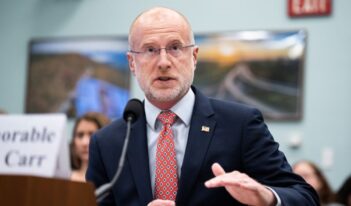
Deregulatory rebuttable presumptions would help advance the goals of the Telecommunications Act.
The time has come for the Federal Communications Commission (FCC) to adopt rebuttable evidentiary presumptions that tilt towards the non-enforcement and repeal or modification of obsolete regulations.
This practice would allow the FCC to use its forbearance authority and regulatory review process as Congress intended when it adopted the Telecommunications Act of 1996. Using deregulatory rebuttable presumptions would be a fairly modest but nevertheless important regulatory reform measure, and it would align with efforts by the current FCC to remove regulations that are not necessary to protect consumers or promote competition.
In the Telecommunications Act, Congress amended the Communications Act of 1934 to establish a “pro-competitive, de-regulatory national policy framework” for telecommunications. Consistent with this goal, the Telecommunications Act added two new provisions. Section 10 expressly authorizes the FCC to forbear from enforcing requirements that are no longer necessary to ensure that telecommunications carriers’ rates and practices are reasonable or to protect consumers or the public interest. Section 11 requires the FCC to periodically review telecommunications regulations and to repeal or modify those that are “no longer necessary in the public interest” due to competition between service providers.
As far as I have been able to determine, Congress’s grant of authority to an agency to forbear, or refrain, from enforcing laws or regulations is very rare. What this means as a practical matter is that the FCC can more readily adjust its regulatory policies to current market conditions. For example, there are still regulations in place, adopted in the 1990s, that require local telephone companies to unbundle their networks and sell the unbundled network elements at below-market rates. And regulations from the same era require telephone companies to conduct certain business lines through separate affiliates. A good case can be made that, in today’s much more competitive communications marketplace, these legacy regulations are no longer necessary. So, the FCC could forbear under Section 10 from enforcing the requirements, or eliminate them entirely in a Section 11 periodic regulatory review proceeding.
Although Sections 10 and 11 could be effective deregulatory tools, the FCC has used them less robustly than it could have. Since 1996, the agency has compiled a disappointing record of denying meritorious petitions for forbearance, delaying ruling on forbearance petitions until the last minute, and imposing procedural requirements that make forbearance relief more difficult to obtain. Section 11 implementation has been similarly constrained with many legacy rules not being seriously considered for repeal or modification.
Given the increasingly competitive communications marketplace and ongoing technological dynamism facilitating development of new service offerings, the use of rebuttable evidentiary presumptions favoring forbearance from enforcement and repeal or modification of obsolete regulations would constitute an important procedural reform. In particular, the FCC should adopt a presumption in forbearance proceedings that, absent clear and convincing evidence to the contrary, “enforcement…is not necessary to ensure that a telecommunications carrier’s charges or practices are not unreasonable or unreasonably discriminatory or necessary for the protection of consumers,” and non-enforcement “is consistent with the public interest.” And the agency should adopt a presumption in the regulatory review process that, absent clear and convincing evidence to the contrary, “regulation is no longer necessary in the public interest as the result of meaningful competition” between service providers.
I first proposed the use of such presumptions in 2011. U.S. Representative Bob Latta (R-Ohio) introduced legislation in 2013 that would have implemented the proposed presumption, but it has not been enacted. Then, in January 2017, along with Free State Foundation Senior Fellow Seth Cooper, I again called for using rebuttable evidentiary presumptions in separate papers—one about forbearance and another about regulatory reviews. But this time I urged the FCC to adopt the presumptions using its rulemaking authority.
Now, the idea has received support within the agency. In a June 2018 address, Commissioner Michael O’Rielly endorsed the proposal, calling for a presumption that “could only be overcome by clear and convincing evidence to the contrary”:
In light of the vibrant competition in the various sectors of the communications marketplace, not only should the Commission review all proceedings with a deregulatory eye, but it should also use available tools, such as forbearance and mandatory reviews, to eliminate unnecessary regulation.…There is no reason why the Commission, on its own accord, could not use such an approach when considering forbearance petitions or reviewing rules.
O’Rielly also included the idea in a December 2018 blog post proposing a variety of reforms for the FCC to consider. Specifically, he called for the FCC to “implement a deregulatory presumption when reviewing and implementing rules and forbearance requests.”
It is within the FCC’s power to adopt these presumptions through the use of its rulemaking authority. The presumptions would not conflict with any other provisions of the Communications Act, an important consideration that agencies have emphasized when adopting similar presumptions. Indeed, the congressional intent of the 1996 Telecommunications Act is deregulatory: Under Section 10, if the FCC does not act in a timely manner on a petition to forbear from regulation, the petition must be granted. Thus, the default position is deregulatory. And the presumptions are consistent with similar presumptions that the FCC and other agencies create and employ.
The FCC can demonstrate the requisite connection between the presumed lack of need for regulation and the competitiveness of the communications market. Congress expressly recognized the increasing competitiveness of this market over two decades ago when it enacted the 1996 amendments. Since then, competition has increased with developments like Voice over Internet Protocol and wireless broadband services becoming increasingly common alternatives to traditional telephone services. And, increasingly, customers substitute other Internet communications alternatives such as WhatsApp, Snapchat, Facebook’s Messenger, and Skype for traditional telecom services.
Finally, I emphasize that the presumptions would not be outcome determinative because they are rebuttable, not absolute. The statutory requirements for forbearance or repeal or modification of regulations would remain the same. Moreover, even if a petitioner could not overcome the presumption, the FCC would still have discretion to determine the scope of forbearance and whether to repeal or modify regulations, as well as the nature of any modification.
Given today’s competitive and technologically dynamic communications marketplace, the FCC should adopt the modest procedural reform of employing deregulatory rebuttable presumptions. This is an idea whose time has come.
This essay draws in part on May’s recent paper, entitled The FCC Should Employ Rebuttable Presumptions to Reduce Unnecessary Regulation.




